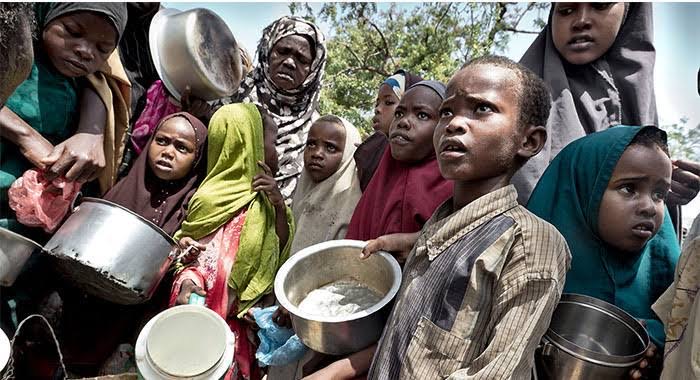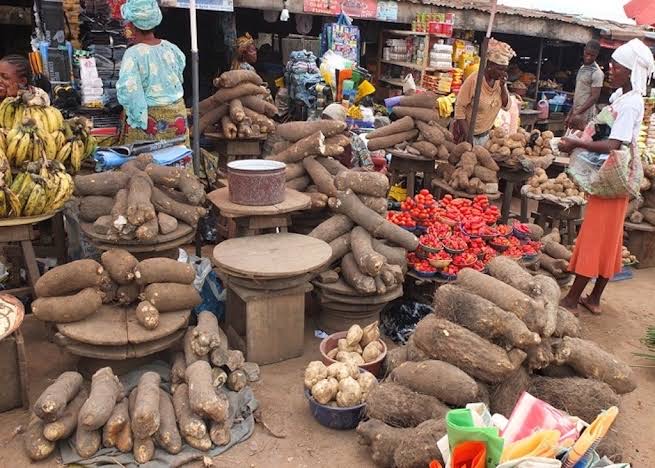As food crises continue in Nigeria, the United Nations has again projected that 82 million Nigerians, or about 64 percent of the country’s population, could face hunger by 2030.
At the same time, they called on the Federal Government to combat climate change, pest infestations, and other threats to agricultural productivity. Journalists reported that the projection comes amid continued food price increases in the country. According to the National Bureau of Statistics (NBS), Nigeria’s food inflation rate will hit a record high of 40.66 percent in May 2024, up from the previous month’s increase of 40.53 percent.
The increase marks the largest year-on-year increase in food prices since records began in 1996. Historically, Nigeria’s average food inflation rate has been 13.42 percent, with the lowest level being -17.50 percent in January 2000.

The United States Food and Agriculture Organization projected that as many as 2.6 million Nigerians will live in Borno, Sokoto state in 2023. Zamfara state and the FCT could face a food crisis between June and August 2024.
An analysis released in March 2024 by the government-run Cadre Harmonisé estimated that about 4.8 million people in Borno, Adamawa, and Yobe states suffer from severe food insecurity, the highest level in seven years.
As Nigerian workers approach May 1, 2024, the Organized Labour Congress expressed concern over rising food prices and fuel shortages in the country, saying the current situation is threatening the survival of workers.
A senior Nigerian lawyer, Olisa Agbakoba, also recently warned that food riots could soon erupt in Nigeria and called on the Federal Government to act swiftly.
The UN Food and Agriculture Organisation Humanitarian Coordinator, represented by a UN official, Taofik Braimoh, stated this at the launch of the CropWatch food security survey in Abuja recently.
“This year’s findings are alarming: About 22 million Nigerians will be food insecure in 2023, and about 80 to 82 million will be severely food insecure by 2030.”
“Nigeria, like many other countries, suffers from food insecurity, climate change, unstable water supplies, pest infestations and other threats to agricultural productivity.”
“As an agricultural society, the success of farms directly impacts the availability of food to its people. Harnessing technology is crucial to strengthening the agricultural sector and ensuring food security. He stressed that satellite-based crop monitoring will provide real-time data on crop conditions, enabling farmers and policymakers to make informed decisions and optimize agricultural practices.”
He said that technology could help accelerate the achievement of the Sustainable Development Goals in the food and agriculture sector.
Agricultural Economist Tobi Awolope of the Centre for Agricultural Development and Sustainable Environment, Federal University of Agriculture, Abeokuta, noted that Nigeria’s high hunger rate is due to climate change, severely affecting smallholder farmers who are the main players in food production.

Awolope, who spoke with our correspondent on Friday, noted that these farmers have little capacity to adapt to the effects of climate change, such as erratic rainfall patterns and lack of irrigation.
“Climate change has reversed progress towards achieving Sustainable Development Goals 1 and 2, which aim to eradicate poverty and hunger.
“Smallholder farmers are struggling to adapt to climate change, which has led to reduced food availability and higher prices,” she said.
She stressed the need for government support for farmers, including by providing subsidies on inputs and technology and irrigation assistance. “Farmers alone cannot mitigate the effects of climate change. Governments must step in and support them to ensure food security,” she said.
Aworope also stressed the importance of using the research recommendations to inform policy decisions, saying “We need to use these recommendations to make informed decisions that support farmers and ensure food availability.”
The Director General of the National Space Research and Development Agency, Dr. Adepoju Mathew emphasized the Importance of Science, Technology, and Innovation in Promoting Agricultural Development and Food Security.
“The world population is expected to reach 9.5 billion by 2050, and food production will need to increase by 70% to meet this demand. Space science, technology, and innovation have a key role to play in transforming agriculture and improving food security,” he added.


































